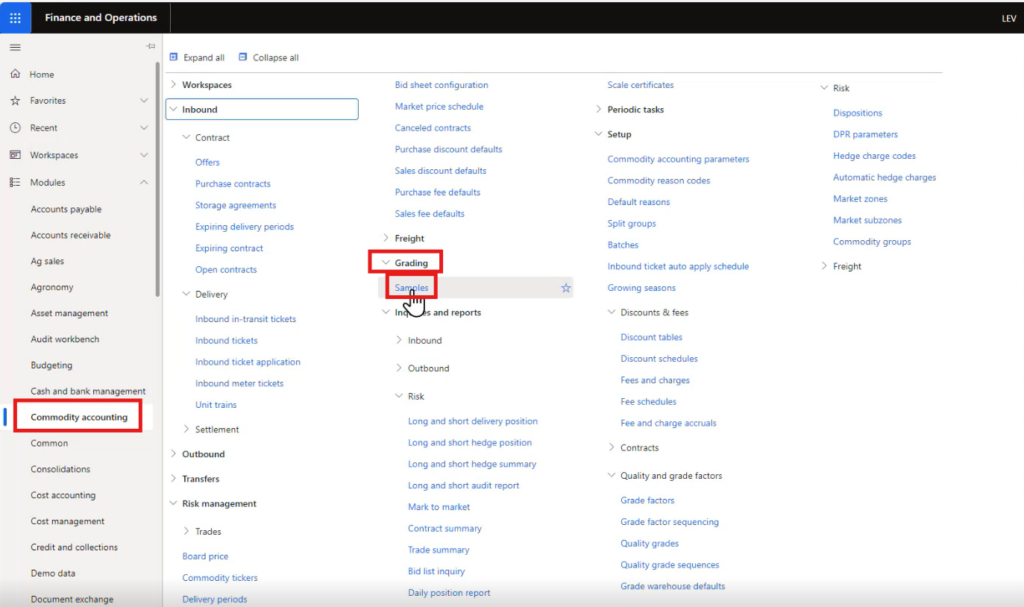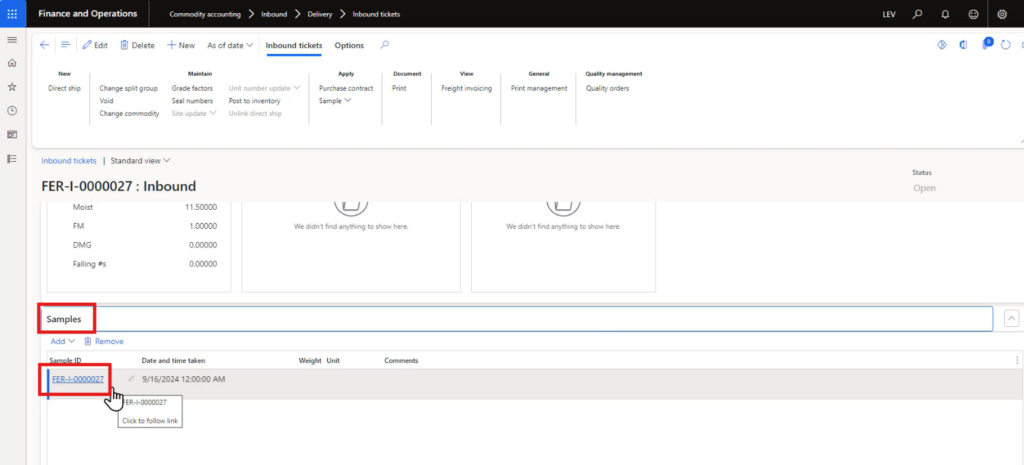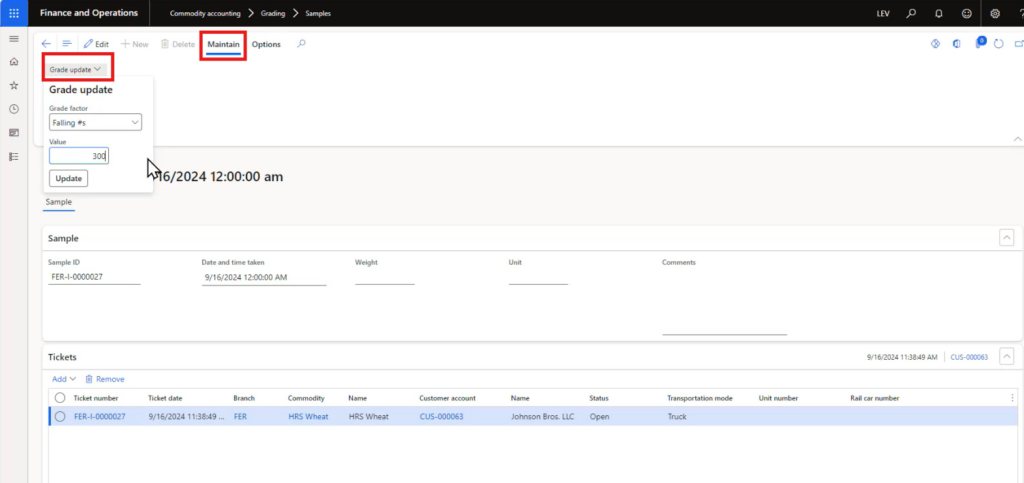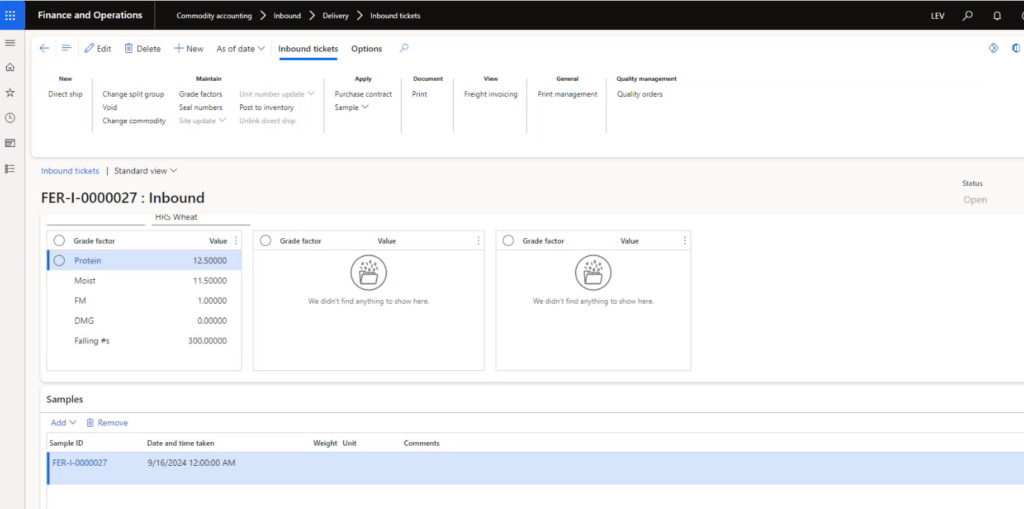Exploring Composite Grades In Levridge
The latest release of Levridge, version 2024 R2, has introduced an exciting and useful feature for commodity accounting—composite grades
What is a Composite Grade?
A composite grade refers to a singular grade or value that represents multiple individual loads or samples of a commodity. In certain cases, commodity handlers may not be able to grade a load of goods immediately due to the need for more specialized testing. Some tests can only be conducted offsite in a lab, with results returning days later.
For instance, imagine you are managing a wheat delivery process. Some samples might need to be tested for falling numbers—a measure of wheat quality that cannot be tested directly at the scale. The composite sample would consist of multiple loads of wheat that are combined and tested together, yielding one result that is then applied across all the tickets for those loads.
How Does It Work in Levridge 2024 R2?
Levridge 2024 R2 has been enhanced with several key features that make handling composite grades much easier.

1. Sample ID Assignment
As each load of commodity arrives, it is entered into the system with a corresponding ticket. A new section has been added to the Inbound Ticket screen where users can attach a Sample ID to the load. This Sample ID acts as a unique identifier for the composite sample that will be sent off for grading.

The system allows Sample IDs to be added manually, or they can be imported electronically via XML if the user is operating an electronic scale system. This flexibility ensures that both manual and automated data entry processes are covered.
2. Lab Testing and Grading
Once the samples are gathered and sent to the lab, the results are returned to the system. In Levridge 2024 R2, there is now a dedicated menu under Commodity Accounting called Grading. Here, users can access and manage the samples that have been sent for testing.
For example, if Sample ID #27 was sent for falling numbers testing, and the results come back showing a value of 300, the user can update that result in the system. The system will then apply the grade to all tickets associated with that Sample ID.
3. Updating Tickets with Composite Grades
After receiving the test results, users can update the related tickets with the composite grade. The system allows users to choose which factor they are updating—for instance, falling numbers, protein content, or any other grade factor that is relevant to the commodity.

Once updated, the grade value is automatically applied to all tickets that share the same Sample ID. This eliminates the need for manual updates across multiple loads, reducing the risk of human error and ensuring consistency across the board.

4. Ticket Updates After Application
Levridge 2024 R2 provides the flexibility to update grade values even after tickets have been applied, meaning the system will retroactively adjust any discounts or other pricing factors affected by the new grade. This feature is especially useful in cases where test results are delayed or where loads are graded after delivery.
However, there are certain restrictions. For instance, on the outbound side, grade values cannot be updated after the ticket has been settled or invoiced. This rule is logical since once a sale is finalized and payment is processed, changing the grade could cause discrepancies in the records.
Benefits of Composite Grades
The introduction of composite grades offers several key advantages for users involved in commodity management and accounting:
1. Streamlined Grading Process: By allowing a single grade to be applied across multiple loads, composite grades reduce the complexity and workload associated with grading commodities. This is particularly helpful for commodities that require time-intensive lab testing, as it reduces the need for multiple individual tests.
2. Increased Accuracy: Since all tickets within a composite sample are graded based on the same lab result, there is greater consistency in the grading process. This ensures that all parties involved, whether they are buyers, sellers, or regulators, have access to uniform and accurate grade data.
3. Time and Cost Savings: Composite grades save time by reducing the number of tests needed to grade a commodity. This also translates into cost savings, as fewer tests are required, and there’s less administrative burden involved in managing the results.
4. Better Control Over Discounts and Pricing: By updating tickets retroactively, users can ensure that any price adjustments based on grade factors are accurate and fair. This helps prevent disputes and ensures transparency in pricing.
5. Enhanced System Flexibility: The ability to add Sample IDs manually or import them electronically means that Levridge Commodity Accounting can adapt to a wide variety of workflows, making it a versatile tool for organizations of all sizes.
Practical Use Case
Let’s walk through a real-world example to illustrate how composite grades work in practice:
– A grain handler receives multiple loads of wheat throughout the day. Instead of grading each load individually, they decide to create a composite sample by taking a portion of each load and sending it to the lab for testing.
– Once the lab returns the test results, showing a falling numbers value of 300, the handler updates the system with this grade. The composite grade is automatically applied to all tickets associated with that sample, ensuring consistency across the deliveries.
– The system also updates any pricing factors or discounts tied to the grade, providing the handler with an accurate overview of costs and revenues.